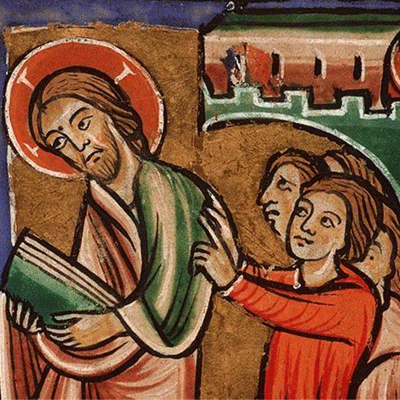 Going from that district, he went to his home town and his disciples accompanied him. With the coming of the sabbath he began teaching in the synagogue and most of them were astonished when they heard him. They said, “Where did the man get all this? What is this wisdom that has been granted him, and these miracles that are worked through him? This is the carpenter, surely, the son of Mary, the brother of James and Joset and Jude and Simon? His sisters, too, are they not here with us?” And they would not accept him. And Jesus said to them, “A prophet is only despised in his own country, among his own relations and in his own house”; and he could work no miracle there, though he cured a few sick people by laying his hands on them. He was amazed at their lack of faith. (Mark 6:1-6)
Going from that district, he went to his home town and his disciples accompanied him. With the coming of the sabbath he began teaching in the synagogue and most of them were astonished when they heard him. They said, “Where did the man get all this? What is this wisdom that has been granted him, and these miracles that are worked through him? This is the carpenter, surely, the son of Mary, the brother of James and Joset and Jude and Simon? His sisters, too, are they not here with us?” And they would not accept him. And Jesus said to them, “A prophet is only despised in his own country, among his own relations and in his own house”; and he could work no miracle there, though he cured a few sick people by laying his hands on them. He was amazed at their lack of faith. (Mark 6:1-6)
Traditionally, the prophets in the Bible had a pretty tough time. Many experienced rejection and persecution and even death. The first reading tells part of the story of Ezekiel’s call to be a prophet.
Common to all the prophets is the conviction that the Word of the Lord must be spoken to the people ‘whether they listen or not’ - the prophet must remain faithful to his vocation even if it costs him his life. In the Gospels Jesus is presented as the prophet par excellence.
With so many of us in lockdown once again, the Gospel today is an apt reminder that God is found not only in readily-identifiable religious places and things, but also in ordinary and everyday people and things. The presence of God surrounds us if only we have the eyes to see it.
In this Sunday’s Gospel we find Jesus in his home town, Nazareth, teaching in the synagogue - faithfully fulfilling his mission to proclaim the Good News. As for many other prophets, that proclamation will eventually cost him his life. Like the other prophets, Jesus, too, experiences rejection. At first the people marvel at Jesus’ teaching and the miracles he has worked elsewhere, but soon they decide that he is just ‘a carpenter (craftsman)’ whose family they know well. Nothing special to be seen here, they seem to think. The old saying, familiarity breeds contempt, seems to sum up their attitude, especially when they refer to Jesus as the son of his mother. Jews were customarily known by their father’s name even if the father had died. Jesus is astonished at their lack of faith.
Faith, in this context, implies an openness to perceive the presence and action of God (the Kingdom). Clearly, the people don’t perceive the action of God in Jesus in spite of the impressive words he spoke and the miracles he performed. Were Jesus’ family circumstances just too ordinary for them? They couldn’t look beyond what was familiar to them in order to see God at work in him. Without that essential openness Jesus finds he can’t work any great miracle among them even though he can cure a few sick people.
Faith is about being in relationship with Jesus (and therefore, with God). Relationships grow as people come to know and understand each other. In a faith relationship, we change as we begin to get to know Jesus and we come to see with his eyes, feel with his heart and act with his intention in the world.
Even in the midst of lockdown God seems to spring up everywhere in all the random acts of kindness which people are doing for each other at this time - grandparents looking after grandchildren during the holidays, neighbours checking on one another, frontline workers and medical personnel, people preparing food and shopping for others.
All you need are the eyes to see.
Download our Celebrating At Home liturgy for this Sunday.
Celebrating At Home 14th Sunday of Ordinary Time [PDF]
Celebrating At Home 14th Sunday of Ordinary Time [ePub]














